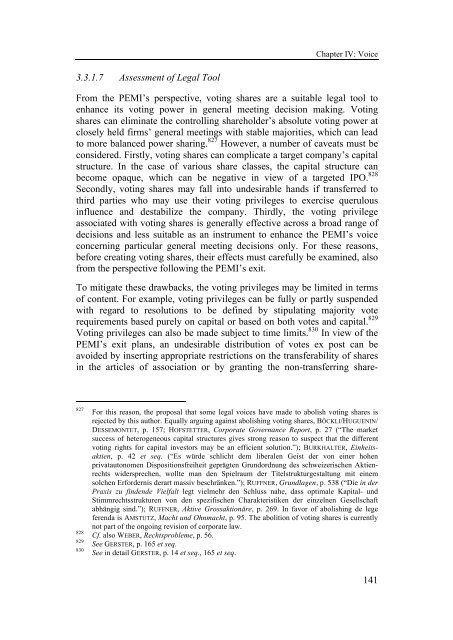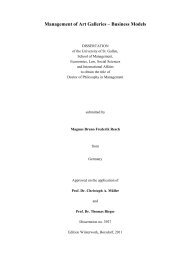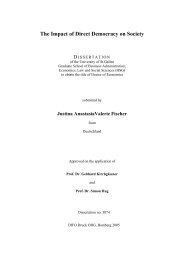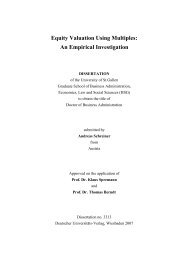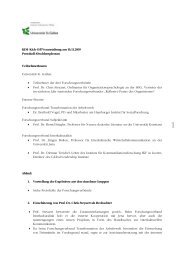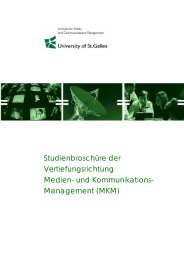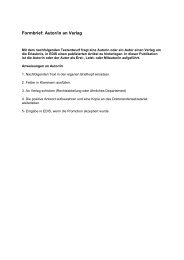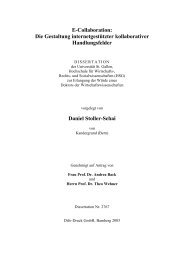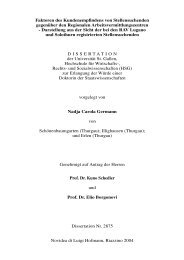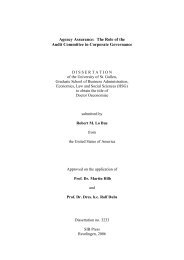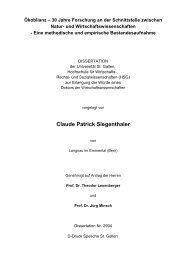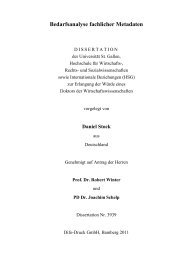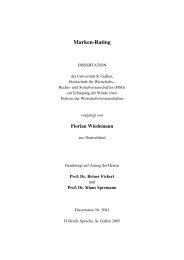- Page 1 and 2:
Private Equity Minority Investments
- Page 3:
AcknowledgementsThe process of writ
- Page 7 and 8:
Executive SummaryTriggered by the f
- Page 9:
Summary ContentsSummary ContentsSum
- Page 12 and 13:
Table of Contents3.2.1 Source of Ca
- Page 14 and 15:
Table of ContentsXIV2 Ex Ante and E
- Page 16 and 17:
Table of ContentsXVI3.3.5 Voting Ag
- Page 18 and 19:
Table of ContentsProtection .......
- Page 20 and 21:
Table of Contents5.3.2 Board of Dir
- Page 24 and 25:
List of FiguresList of FiguresFigur
- Page 26 and 27:
BibliographyTable of ReferencesACHA
- Page 28:
BibliographyASTRACHAN, Joseph H. an
- Page 31 and 32:
Bibliography- “Corporate Governan
- Page 33 and 34:
BibliographyBURKHALTER, Thomas, Ein
- Page 37 and 38:
Bibliography- “Herausforderungen
- Page 39 and 40:
Bibliography- “Interessenkonflikt
- Page 41 and 42:
Bibliographyavailable at http://www
- Page 43 and 44:
BibliographyHART, Oliver, “Incomp
- Page 45 and 46:
BibliographyHUSER, Patrick A., Anle
- Page 49 and 50:
BibliographyLUBATKIN, Michael H., S
- Page 51 and 52:
BibliographyMODIGLIANI, Franco and
- Page 53 and 54:
of MPRDC without reference to the a
- Page 55 and 56:
BibliographyRÜDISSER, Michèle, Bo
- Page 57 and 58:
BibliographySTOUT, Lynn A., “The
- Page 59 and 60:
Bibliography- “Interessenkonflikt
- Page 61 and 62:
BibliographyWEBER, Martin, “Recht
- Page 63 and 64:
List of AbbreviationsList of Abbrev
- Page 65 and 66:
lit.MBI / MBOMerger ActNNBERNo.NZZl
- Page 67 and 68:
Part One: Introduction andTheoretic
- Page 69 and 70:
Chapter I: Introductionfinancial cr
- Page 71 and 72:
Chapter I: IntroductionBResearch To
- Page 73 and 74:
Chapter I: Introductionaddress in p
- Page 75 and 76:
Chapter I: Introductioninvestment s
- Page 77 and 78:
Chapter I: Introductioninvestors pu
- Page 79 and 80:
Chapter I: Introductioninvestments
- Page 81 and 82:
Chapter I: Introductioncorporations
- Page 83 and 84:
Chapter II: Theoretical Foundations
- Page 85 and 86:
Chapter II: Theoretical Foundations
- Page 87 and 88:
Chapter II: Theoretical Foundations
- Page 89 and 90:
Chapter II: Theoretical Foundations
- Page 91 and 92:
Chapter II: Theoretical Foundations
- Page 93 and 94:
Chapter II: Theoretical Foundations
- Page 95 and 96:
Chapter II: Theoretical Foundations
- Page 97 and 98:
Chapter II: Theoretical Foundations
- Page 99 and 100:
Chapter II: Theoretical Foundations
- Page 101 and 102:
Chapter II: Theoretical Foundations
- Page 103 and 104:
Chapter II: Theoretical Foundations
- Page 105 and 106:
Chapter II: Theoretical Foundations
- Page 107 and 108:
Chapter II: Theoretical Foundations
- Page 109 and 110:
Chapter II: Theoretical Foundations
- Page 111 and 112:
Chapter II: Theoretical Foundations
- Page 113 and 114:
Chapter II: Theoretical Foundations
- Page 115 and 116:
Chapter II: Theoretical Foundations
- Page 117 and 118:
Chapter II: Theoretical Foundations
- Page 119 and 120:
Chapter II: Theoretical Foundations
- Page 121 and 122:
Chapter II: Theoretical Foundations
- Page 123 and 124:
Chapter II: Theoretical Foundations
- Page 125 and 126:
Chapter II: Theoretical Foundations
- Page 127 and 128:
Chapter II: Theoretical Foundations
- Page 129 and 130:
2.1.2 Underlying Assumptions and Ke
- Page 131 and 132:
Chapter II: Theoretical Foundations
- Page 133 and 134:
Chapter II: Theoretical Foundations
- Page 135 and 136:
Chapter II: Theoretical Foundations
- Page 137:
Chapter II: Theoretical Foundations
- Page 140 and 141:
Part Two: Legal Framework and Tools
- Page 142 and 143:
Part Two: Legal Framework and Tools
- Page 144 and 145:
Part Two: Legal Framework and Tools
- Page 146 and 147:
Part Two: Legal Framework and Tools
- Page 148 and 149:
Part Two: Legal Framework and Tools
- Page 150 and 151:
Part Two: Legal Framework and Tools
- Page 152 and 153:
Part Two: Legal Framework and Tools
- Page 154 and 155:
Part Two: Legal Framework and Tools
- Page 156 and 157: Part Two: Legal Framework and Tools
- Page 158 and 159: Part Two: Legal Framework and Tools
- Page 160 and 161: Part Two: Legal Framework and Tools
- Page 162 and 163: Part Two: Legal Framework and Tools
- Page 164 and 165: Part Two: Legal Framework and Tools
- Page 166 and 167: Part Two: Legal Framework and Tools
- Page 168 and 169: Part Two: Legal Framework and Tools
- Page 170 and 171: Part Two: Legal Framework and Tools
- Page 172 and 173: Part Two: Legal Framework and Tools
- Page 174 and 175: Part Two: Legal Framework and Tools
- Page 176 and 177: Part Two: Legal Framework and Tools
- Page 178 and 179: Part Two: Legal Framework and Tools
- Page 180 and 181: Part Two: Legal Framework and Tools
- Page 182 and 183: Part Two: Legal Framework and Tools
- Page 184 and 185: Part Two: Legal Framework and Tools
- Page 186 and 187: Part Two: Legal Framework and Tools
- Page 188 and 189: Part Two: Legal Framework and Tools
- Page 190 and 191: Part Two: Legal Framework and Tools
- Page 192 and 193: Part Two: Legal Framework and Tools
- Page 194 and 195: Part Two: Legal Framework and Tools
- Page 196 and 197: Part Two: Legal Framework and Tools
- Page 198 and 199: Part Two: Legal Framework and Tools
- Page 200 and 201: Part Two: Legal Framework and Tools
- Page 202 and 203: Part Two: Legal Framework and Tools
- Page 204 and 205: Part Two: Legal Framework and Tools
- Page 208 and 209: Part Two: Legal Framework and Tools
- Page 210 and 211: Part Two: Legal Framework and Tools
- Page 212 and 213: Part Two: Legal Framework and Tools
- Page 214 and 215: Part Two: Legal Framework and Tools
- Page 216 and 217: Part Two: Legal Framework and Tools
- Page 218 and 219: Part Two: Legal Framework and Tools
- Page 220 and 221: Part Two: Legal Framework and Tools
- Page 222 and 223: Part Two: Legal Framework and Tools
- Page 224 and 225: Part Two: Legal Framework and Tools
- Page 226 and 227: Part Two: Legal Framework and Tools
- Page 228 and 229: Part Two: Legal Framework and Tools
- Page 230 and 231: Part Two: Legal Framework and Tools
- Page 232 and 233: Part Two: Legal Framework and Tools
- Page 234 and 235: Part Two: Legal Framework and Tools
- Page 236 and 237: Part Two: Legal Framework and Tools
- Page 238 and 239: Part Two: Legal Framework and Tools
- Page 240 and 241: Part Two: Legal Framework and Tools
- Page 242 and 243: Part Two: Legal Framework and Tools
- Page 244 and 245: Part Two: Legal Framework and Tools
- Page 246 and 247: Part Two: Legal Framework and Tools
- Page 248 and 249: Part Two: Legal Framework and Tools
- Page 250 and 251: Part Two: Legal Framework and Tools
- Page 252 and 253: Part Two: Legal Framework and Tools
- Page 254 and 255: Part Two: Legal Framework and Tools
- Page 256 and 257:
Part Two: Legal Framework and Tools
- Page 258 and 259:
Part Two: Legal Framework and Tools
- Page 260 and 261:
Part Two: Legal Framework and Tools
- Page 262 and 263:
Part Two: Legal Framework and Tools
- Page 264 and 265:
Part Two: Legal Framework and Tools
- Page 266 and 267:
Part Two: Legal Framework and Tools
- Page 268 and 269:
Part Two: Legal Framework and Tools
- Page 270 and 271:
Part Two: Legal Framework and Tools
- Page 272 and 273:
Part Two: Legal Framework and Tools
- Page 274 and 275:
Part Two: Legal Framework and Tools
- Page 276 and 277:
Part Two: Legal Framework and Tools
- Page 278 and 279:
Part Two: Legal Framework and Tools
- Page 280 and 281:
Part Two: Legal Framework and Tools
- Page 282 and 283:
Part Two: Legal Framework and Tools
- Page 284 and 285:
Part Two: Legal Framework and Tools
- Page 286 and 287:
Part Two: Legal Framework and Tools
- Page 288 and 289:
Part Two: Legal Framework and Tools
- Page 290 and 291:
Part Two: Legal Framework and Tools
- Page 292 and 293:
Part Two: Legal Framework and Tools
- Page 294 and 295:
Part Two: Legal Framework and Tools
- Page 296 and 297:
Part Two: Legal Framework and Tools
- Page 298 and 299:
Part Two: Legal Framework and Tools
- Page 300 and 301:
Part Two: Legal Framework and Tools
- Page 302 and 303:
Part Two: Legal Framework and Tools
- Page 304 and 305:
Part Two: Legal Framework and Tools
- Page 306 and 307:
Part Two: Legal Framework and Tools
- Page 308 and 309:
Part Two: Legal Framework and Tools
- Page 310 and 311:
Part Two: Legal Framework and Tools
- Page 312 and 313:
Part Two: Legal Framework and Tools
- Page 314 and 315:
Part Two: Legal Framework and Tools
- Page 316 and 317:
Part Two: Legal Framework and Tools
- Page 318 and 319:
Part Two: Legal Framework and Tools
- Page 320 and 321:
Part Two: Legal Framework and Tools
- Page 322 and 323:
Part Two: Legal Framework and Tools
- Page 324 and 325:
Part Two: Legal Framework and Tools
- Page 326 and 327:
Part Two: Legal Framework and Tools
- Page 328 and 329:
Part Two: Legal Framework and Tools
- Page 330 and 331:
Part Two: Legal Framework and Tools
- Page 332 and 333:
Part Two: Legal Framework and Tools
- Page 334 and 335:
Part Two: Legal Framework and Tools
- Page 336 and 337:
Part Two: Legal Framework and Tools
- Page 338 and 339:
Part Two: Legal Framework and Tools
- Page 340 and 341:
Part Two: Legal Framework and Tools
- Page 342 and 343:
Part Two: Legal Framework and Tools
- Page 344 and 345:
Part Two: Legal Framework and Tools
- Page 346 and 347:
Part Two: Legal Framework and Tools
- Page 348 and 349:
Part Two: Legal Framework and Tools
- Page 350 and 351:
Part Two: Legal Framework and Tools
- Page 352 and 353:
Part Two: Legal Framework and Tools
- Page 354 and 355:
Part Two: Legal Framework and Tools
- Page 356 and 357:
Part Two: Legal Framework and Tools
- Page 358 and 359:
Part Two: Legal Framework and Tools
- Page 360 and 361:
Part Two: Legal Framework and Tools
- Page 362 and 363:
Part Two: Legal Framework and Tools
- Page 364 and 365:
Part Two: Legal Framework and Tools
- Page 366 and 367:
Part Two: Legal Framework and Tools
- Page 368 and 369:
Part Two: Legal Framework and Tools
- Page 370 and 371:
Part Two: Legal Framework and Tools
- Page 372 and 373:
Part Two: Legal Framework and Tools
- Page 374 and 375:
Part Two: Legal Framework and Tools
- Page 376 and 377:
Part Two: Legal Framework and Tools
- Page 378 and 379:
Part Two: Legal Framework and Tools
- Page 380 and 381:
Part Two: Legal Framework and Tools
- Page 382 and 383:
Part Two: Legal Framework and Tools
- Page 384 and 385:
Part Two: Legal Framework and Tools
- Page 386 and 387:
Part Two: Legal Framework and Tools
- Page 388 and 389:
Part Two: Legal Framework and Tools
- Page 390 and 391:
Part Two: Legal Framework and Tools
- Page 392 and 393:
Part Two: Legal Framework and Tools
- Page 394 and 395:
Part Two: Legal Framework and Tools
- Page 396 and 397:
Part Two: Legal Framework and Tools
- Page 398 and 399:
Part Two: Legal Framework and Tools
- Page 400 and 401:
Part Two: Legal Framework and Tools
- Page 402 and 403:
Part Two: Legal Framework and Tools
- Page 404 and 405:
Part Two: Legal Framework and Tools
- Page 406 and 407:
Part Two: Legal Framework and Tools
- Page 408 and 409:
Part Two: Legal Framework and Tools
- Page 410 and 411:
Part Two: Legal Framework and Tools
- Page 412 and 413:
Part Two: Legal Framework and Tools
- Page 414 and 415:
Part Two: Legal Framework and Tools
- Page 416 and 417:
Part Two: Legal Framework and Tools
- Page 418 and 419:
Part Two: Legal Framework and Tools
- Page 420 and 421:
Part Two: Legal Framework and Tools
- Page 422 and 423:
Part Two: Legal Framework and Tools
- Page 424 and 425:
Part Two: Legal Framework and Tools
- Page 426 and 427:
Part Two: Legal Framework and Tools
- Page 428 and 429:
Part Two: Legal Framework and Tools
- Page 430 and 431:
Part Two: Legal Framework and Tools
- Page 432 and 433:
Part Two: Legal Framework and Tools
- Page 434 and 435:
Part Two: Legal Framework and Tools
- Page 436 and 437:
Part Two: Legal Framework and Tools
- Page 438 and 439:
Part Two: Legal Framework and Tools
- Page 440 and 441:
Part Two: Legal Framework and Tools
- Page 442 and 443:
Part Two: Legal Framework and Tools
- Page 444 and 445:
Part Two: Legal Framework and Tools
- Page 446 and 447:
Part Two: Legal Framework and Tools
- Page 448 and 449:
Part Two: Legal Framework and Tools
- Page 450 and 451:
Part Two: Legal Framework and Tools
- Page 452 and 453:
Part Two: Legal Framework and Tools
- Page 454 and 455:
Part Two: Legal Framework and Tools
- Page 456 and 457:
Part Two: Legal Framework and Tools
- Page 458 and 459:
Part Two: Legal Framework and Tools
- Page 460 and 461:
Part Two: Legal Framework and Tools
- Page 462 and 463:
Part Two: Legal Framework and Tools
- Page 464 and 465:
Part Two: Legal Framework and Tools
- Page 466 and 467:
Part Two: Legal Framework and Tools
- Page 468 and 469:
402
- Page 470 and 471:
Part Three: Case Study - SimilorGro
- Page 472 and 473:
Part Three: Case Study - SimilorGro
- Page 474 and 475:
Part Three: Case Study - SimilorGro
- Page 476 and 477:
Part Three: Case Study - SimilorGro
- Page 478 and 479:
Part Three: Case Study - SimilorGro
- Page 480 and 481:
Part Three: Case Study - SimilorGro
- Page 482 and 483:
Part Three: Case Study - SimilorGro
- Page 484:
Judith Verena Söding (1983) studie


